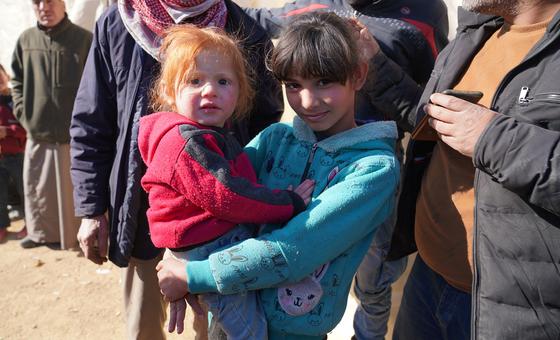Afshan Khan, UNICEF Regional Director for Europe and Central Asia, briefed journalists in Geneva on her recent visit to the region, where she saw first-hand some of the destruction.
“Children in Türkiye are at risk of developing anxiety, depression, and post-traumatic stress disorder; they need to be able to resume their education, and they urgently need psychosocial support to help deal with the trauma they have experienced,” she said.
Homeless, hungry and cold
Both Türkiye and Syria were rocked by earthquakes on 6 February, and another struck Türkiye earlier this week.
Ms. Khan visited Kahramanmaras, one of the 11 most affected provinces, where thousands of families are still huddled in shelters and temporary accommodation, or taking refuge in cars, bus stations, under bridges, and in makeshift tents.
Survivors face homelessness, lack of food and water, and freezing temperatures, especially at night, she said, adding that more than one million people are staying in temporary accommodation shelters with limited access to essential services.
“I visited one of these centres in Kahramanmaras. Initially hosting 9,000 people, this centre is now home to almost 18,000. Nearly one third of them are children. The space is cramped, and living conditions are dire,” she said.
Education at risk
The education of nearly four million children, including over 350,000 refugees and migrants, is at risk, she warned, due to the overwhelming number of damaged or destroyed schools.
“We know how important learning and routine is for children and their recovery,” she said. “Right now, amid such destruction and uncertainty, children need support so they can regain a sense of normalcy.”
Türkiye also hosts the world’s largest number of refugees, including roughly 3.6 million people from war-ravaged Syria. Some of the 800,000 Syrian refugee children in the country are among those affected by the earthquake.
“So many had already lost their homes once before; this is the complexity of the tragedy that we see before us now,” she said.

Clearing rubble, for example in Kahramanmaraş in Türkiye, is an essential part of recovery efforts following the earthquake.
Removing the rubble
Meanwhile, the UN Development Programme (UNDP) is seeking $113.5 million to support early recovery in Türkiye in the aftermath of the earthquakes, with most of the funding going towards removing mountains of rubble, estimated at between 116 million and 210 million tonnes.
The request is part of the broader $1 billion UN appeal for the country, launched last week.
UNDP Resident Representative Louisa Vinton said ongoing support for the emergency response will be followed by a look ahead to the massive effort that will be needed to restore normal life in the area.
“Clearing rubble is a vital first step, but we need to show reverence for the human lives and dreams that lie buried,” she said.
Protecting public health
Priorities include helping to prevent public health threats to affected populations and emergency responders. As a first measure, UNDP has sent 160 dumpster-size waste bins, 54,000 kilogrammes of quicklime, and 10,400 litres of disinfectant to municipal authorities in Hatay.
UNDP also will deliver portable toilets and urgently needed waste collection supplies to affected communities while also working to repair some of the most urgently needed damaged water utilities.
The agency is planning to support the Government in addressing what it described as “the daunting task of debris management and rubble removal”.
Of the more than one million structures inspected so far, 156,000 buildings containing more than 500,000 separate homes and offices have either completely collapsed or are so damaged they will require demolition, Turkish authorities have reported.

